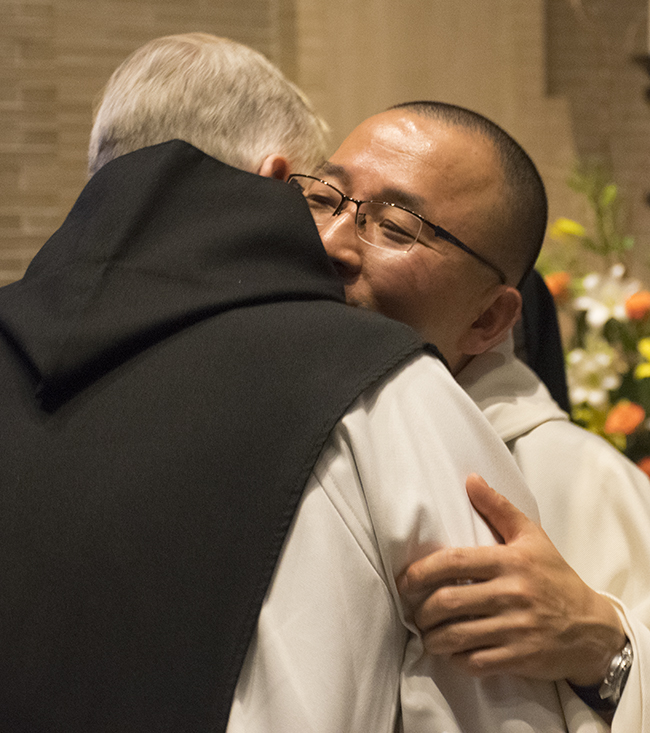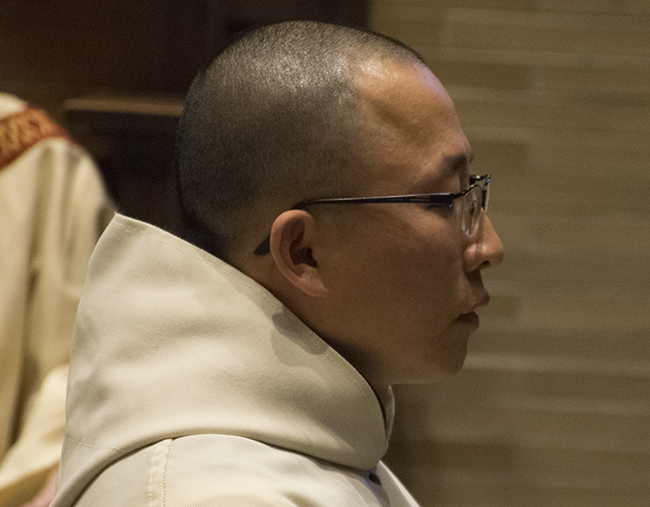Brother John
God never lets anyone of us go. God’s persistence is infinite. Such persistence is a facet of divine love, divine mercy. God’s call is always personal and persistent. Brother John, God called you into existence in all your uniqueness. And God has never ceased to sustain you in existence, through your childhood, the love of your family, your adolescence. God’s loving persistence and persistent loving has brought you here today.
In this morning’s Gospel from John 21, we see Jesus and Peter in lively conversation after their breakfast together on the beach. It is one of the most poignant exchanges in all of Scripture. Jesus will not let go of Peter, three times he asks Peter if he loves him. These three questions correspond to Peter’s three-fold denial of Jesus on the night of his agony. And the smell of the charcoal fire on which Jesus has just cooked the disciples’ breakfast is a poignant reminder of the charcoal fire in the high-priest’s courtyard on the night of Peter’s betrayal. Jesus is not trying to torture Peter or make him grovel over past failures. Jesus wants Peter to remember because such remembering has to do with making whole, integrating. Such remembering matters because it has to do with healing and wholeness; in other words, because it has to do with salvation.
But how can we hold the truth of our experience open to healing, so that it can be an occasion of grace and new life? This is what the resurrected Jesus invites Peter to do, to remember his betrayal, his three-fold denial in the context of forgiveness and his continued relationship with Jesus. Peter’s acknowledged and forgiven failure then becomes the source of a new identity and vocation for him. Such redemptive remembering is never self-satisfied or sentimental because it always involves being with the past in such a way as to be drawn into a more truthful and authentic future. It is not about complacency but maturing and continuing to grow. And this is at that heart of our monastic vow of conversion.
The Resurrection of Jesus means that there is no experience that cannot be transformed in the context of Christ’s forgiveness and continued, persistent call. God has never and will never stop calling you, loving you, Brother John! Remembering in the light of the Resurrection is fundamentally a work of contemplation and conversion (and these two can never really be separated and are really an excellent summation of the Cistercian monastic vocation that you are committing yourself to today). Such remembering in the light of the Resurrection means trusting that new life really can arise from death.
The Gospel scene that you chose for today takes place on the shore of the Lake of Tiberius. This is the same place, in Luke’s Gospel, that Jesus first encounters Peter. Peter and his companions have been cleaning their nets, and Jesus borrows Peter’s boat so that he can preach to the crowds on the shore. Afterwards Jesus tells Peter, “Put out into deep water and let down your nets for a catch.” There is something about deep water that is frightening. Deep water is a risky place to be in. You cannot see what might be down there. You may be in over your head; people drown in deep water. It is the place where we are buried with Christ and raised with Christ. It is where we experience the fullness of our baptism; where we taste the fullness of divine life.
Brother John, the world does not need smarter people, more efficient people or more beautiful people. The world and this community do need deep people who are willing to venture into deep waters; people who are willing to be transformed; people willing to go in over their heads, people willing to trust beyond their understanding and fears and failures. This is the place to which you are being invited today, invited to join us, your brothers of Saint Joseph’s Abbey, in drowning and swimming in the relentless, loving mercy of God.
Homily of Dom Damian for the Solemn Profession of Brother John Kim. Easter Saturday, 2 April 2016



